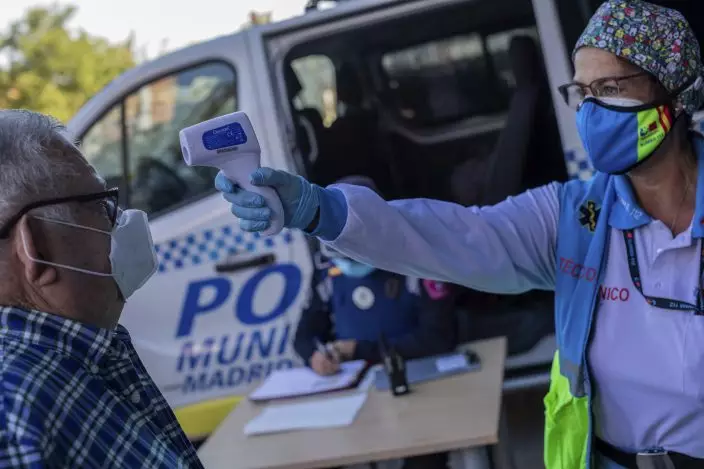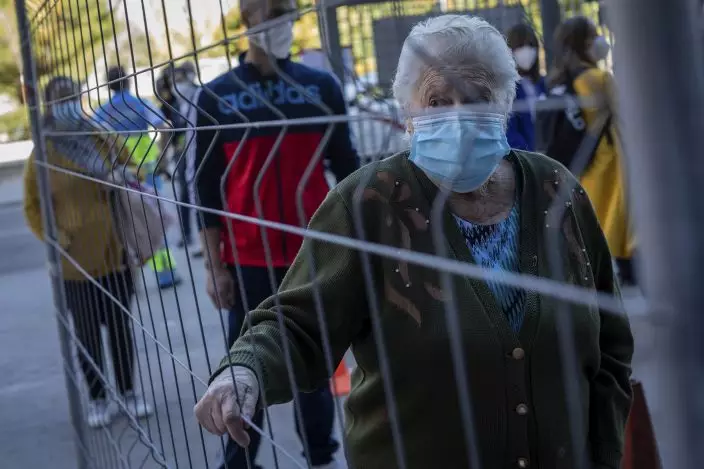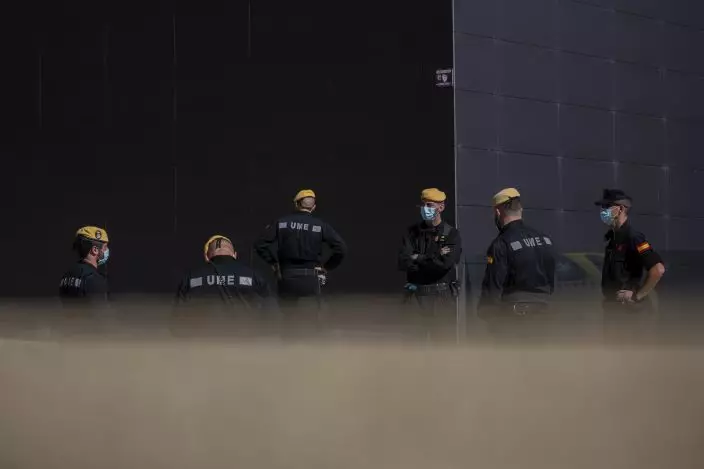Madrid and its suburbs, the region in Europe where a second coronavirus wave is expanding by far the fastest, are edging toward stricter curbs on personal movement and social gatherings after a political dispute that has angered many Spaniards.
Health officials from Spain’s central government and the Madrid region agreed late Tuesday on a set of health metrics that should dictate standardized restrictions in cities with a population of 100,000 or more. The new plan needs to be approved at a meeting with health officials from all Spanish regions later Wednesday.
The deal, outlined by Spanish Health Minister Salvador Illa, follows weeks of a sour public disagreement on how to tackle uncontrolled virus clusters in Madrid, the Spanish capital.

A Madrid Emergency Service (SUMMA) health worker checks the temperature of a man prior conducting a rapid antigen test for COVID-19 in the southern neighbourhood of Vallecas in Madrid, Spain, Tuesday, Sept. 29, 2020. Madrid has a rate of infection 2.5 times higher than the national average, which is already three times the European average, including the UK. (AP PhotoBernat Armangue)
The central left-wing government of Prime Minister Pedro Sánchez was demanding tougher action in Madrid that wouldn’t only target the city’s working-class neighborhoods, while the Madrid government, in the hands of a center-right coalition, resisted a city-wide partial lockdown for fear of damaging the regional economy further.
Madrid is leading the new wave of infections in Spain and Europe.
The Madrid region has a two-week infection rate of 784 cases per 100,000 residents, 2.5 times higher than a national average of 294 cases and seven times more than the average rate in Europe and the U.K., which stood at 94 last week, according to EU statistics.

Madrid Emergency Service (SUMMA) health workers conduct rapid antigen tests for COVID-19 in the southern neighbourhood of Vallecas in Madrid, Spain, Tuesday, Sept. 29, 2020. Madrid has a rate of infection 2.5 times higher than the national average, which is already three times the European average, including the UK. (AP PhotoBernat Armangue)
Spain has seen more than 748,000 infections and has a confirmed virus death toll of over 31,400, but experts say all numbers understate the true toll of the pandemic due to limited testing and other factors.
Follow AP’s pandemic coverage at http://apnews.com/VirusOutbreak and https://apnews.com/UnderstandingtheOutbreak

A Madrid Emergency Service (SUMMA) health workers conducts a rapid antigen test for COVID-19 in the southern neighbourhood of Vallecas in Madrid, Spain, Tuesday, Sept. 29, 2020. Madrid has a rate of infection 2.5 times higher than the national average, which is already three times the European average, including the UK. (AP PhotoBernat Armangue)

An elderly woman lines up for a rapid antigen test for COVID-19 in the southern neighbourhood of Vallecas in Madrid, Spain, Tuesday, Sept. 29, 2020. Madrid has a rate of infection 2.5 times higher than the national average, which is already three times the European average, including the UK. (AP PhotoBernat Armangue)

Members of the UME (Emergency Army Unit) gather outside a center used to conduct rapid antigen test for COVID-19 in the southern neighbourhood of Vallecas in Madrid, Spain, Tuesday, Sept. 29, 2020. Madrid has a rate of infection 2.5 times higher than the national average, which is already three times the European average, including the UK. (AP PhotoBernat Armangue)


